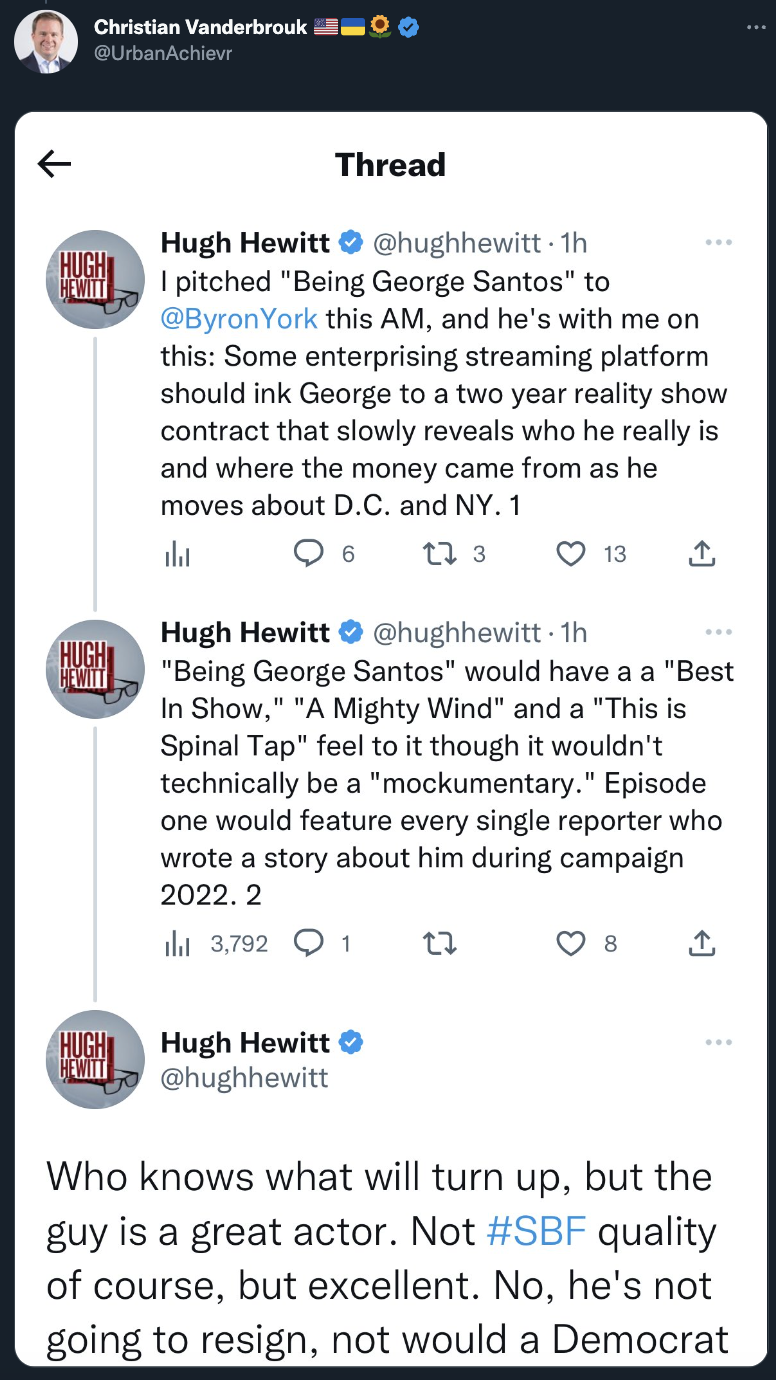All politicians lie. Most lie chronically. Some lie so much, or so brazenly, that lying becomes their “brand.”
Voters expect it. If a friend told you he was voting for candidate X and you replied, astonished, “But he lies!” imagine the look of contempt and pity you’d draw in response.
The bar for honesty in politics is so low at this stage of American decline that it might be impossible for a candidate not to clear it. This country elected Donald Trump president, then nearly elected him again. If a con man is qualified to hold our most powerful office, con men logically must be qualified to hold lesser offices. There’s no amount of dishonesty that’s disqualifying.
In theory. We’re about to test that proposition.
The most enjoyable story in politics as 2022 winds down is the saga of George Santos, the newly elected Republican congressman from New York’s 3rd District. Santos flipped the seat after Democratic incumbent Tom Suozzi retired to run for governor, a rare GOP pick-up in an otherwise dismal midterm that helped make their new House majority. In a party known for being old, white, and “traditional,” Santos stood out as a 34-year-old openly gay man of Brazilian descent, one whose Jewish maternal grandparents had escaped persecution in Ukraine and then Belgium during World War II. He cut an impressive figure—college graduate, alumnus of Goldman Sachs and Citigroup, founder of an animal rescue charity, and landlord of no less than 13 properties owned by his wealthy family.
You can see why the party took a shine to him. He had an appealing biography and he could self-fund.
He embellished a bit, it turns out.
Our current chief executive is also an embellisher, to the point that one might properly call him a fabulist. But Santos’ deceptions are so audacious and so comprehensive that I’m not sure there’s any precedent for him in our politics. Donald Trump might grossly exaggerate his wealth, for instance, but there’s no question that he’s a wealthy man. Joe Biden might exaggerate episodes from the past but he’s led a public life for 50 years. We can read his tax returns.
The only thing we’re sure of about George Santos is that his name does appear to be George Santos. Is that all the honesty that’s required to serve in the U.S. House of Representatives?
Santos’ narrative unraveled a week ago with the first in a series of New York Times exposés about his past. There were rumors during his campaign that something was amiss: Democrats flagged questions about his charity in their opposition research about him and local reporters wondered how his net worth had jumped so fast so soon. “Are we being played as extras in ‘The Talented Mr Santos’?” one prescient senior House Republican wondered this summer. Reportedly Santos’ mendacity became a “running joke” within the leadership, which assumed that Democrats or the media would pull back the curtain on him before the election. Liberals had had ample time to sniff him out, after all. This was his second run for Congress after losing to Suozzi in 2020.
But the exposé never came. Not until last Monday, with Santos two weeks away from being sworn in as a congressman, did the Times finally grab hold of the curtain. We need to go through it in detail so that you grasp the scale of deception here. This isn’t so much “lying” as assuming a wholly invented identity.
He didn’t graduate from college, it turns out. His claim of having attended Baruch was a lie, he now admits. His employment at Goldman and Citigroup was another lie. Neither company has a record of him working there. Santos explained this week that he had chosen his words poorly and had only meant to say that the company he actually worked for, LinkBridge Investors, had done work for Goldman and Citigroup. But that can’t be squared with the former language on his campaign website, which alleged that he “began working at Citigroup as an associate and quickly advanced to become an associate asset manager in the real asset division of the firm.”
His charity, “Friends of Pets United,” exists—sort of. It held at least one fundraising event in years past. (More on that below.) But the IRS has no record of any filing in the organization’s name, which would be necessary for it to qualify for tax exemption.
His 13 properties must be real, no? After all, Santos tweeted about the hardships his family experienced as landlords during the pandemic.
There are no properties, he confessed to the New York Post on Monday.
Many people exaggerate their wealth and professional experience, if rarely as extremely as Santos has. But comparatively few fabricate a personal connection to the Holocaust, which he appears to have done with the biographical detail about his grandparents. An investigation by Forward revealed that his maternal grandparents were born in Brazil, not Europe. How Ukraine ended up in Santos’ tall tale is unclear; possibly he included it to leverage voters’ current sympathy for the country. Confronted about the deception, he now claims that his grandmother told him stories about converting from Judaism to Catholicism but insisted that it doesn’t matter because he told no lies in this case. “I never claimed to be Jewish,” he insisted to the New York Post. “I am Catholic. Because I learned my maternal family had a Jewish background I said I was ‘Jew-ish.’”
“Jew-ish,” not “Jewish.” Which sounds like a lost Larry David bit.
And he’s lying about this too, needless to say. He did claim to be Jewish (not Jew-ish) by describing himself as a “proud American Jew” in a position paper circulated earlier this year. And last month, addressing the Republican Jewish Coalition, Santos appeared to allude to himself when boasting that there would soon be a third Jewish Republican in Congress. (As of Tuesday morning, he’s no longer welcome at RJC events.)
The Holocaust isn’t the only calamity to which he seems to have falsely attached himself. He’s said before that a company he worked for at the time “lost four employees” in the 2016 massacre at Pulse nightclub shooting in Orlando, Florida, but the Times couldn’t verify it. When Santos was again asked about it this week, he clarified that the four “were going to be coming to work for the company that I was starting up in Orlando” but were in the process of being hired. The probability that four people who, presumably, didn’t know each other or work together (yet) would end up dying in the same mass shooting strikes me as … low.
At this point you might be thinking, “Are we sure he’s even gay?” A man willing to lie about anything and everything to spruce up his political appeal might reasonably conclude that identifying as gay is more of an asset than a liability in a state like New York, especially for a party that’s keen to be seen as more diverse. As chance would have it, it turns out that George Santos was married to a woman as recently as 2019. He reminded the Post this week that many people don’t accept their sexuality until later in life, but it’s notable that the Times has been unable to unearth much information about his alleged husband, “Matt.”
If this were the full extent of his lies, it would make for an interesting debate about whether he should be expelled from Congress. Personally, I think we should have more exacting standards for federal legislators than, say, for college football coaches since Americans deserve to have a basic sense of who’s representing them in government. For all of his lies, you knew in broad terms what you were getting when you voted for Trump—a rich celebrity scumbag with an alarming fondness for authoritarians. You knew what you were getting with Biden too—a liberal dinosaur doomed to forever wander between “having lost a step” and senility. Voters in Santos’ district don’t have the first clue what they’re getting with their new congressman. They literally don’t know where he lives. His Democratic opponent described him, aptly, as “the Anna Delvey candidate of this congressional midterm election cycle.” Is Anna Delvey fit to serve in Congress?
One might respond to those objections this way: “Santos is a U.S. citizen, he’s of constitutional age, and his lies haven’t hurt anyone. His district will render their verdict on him in two years. Frankly, there’s nothing more American than fake-it-until-you-make-it hucksterism. I admire his moxie!”
Okay. Would it change your opinion if it turned out that Santos’ lies did hurt people, though?
What if I told you he wasn’t just a con man but quite possibly a deadbeat and a swindler?
It would be strange if a liar as prolific as him didn’t try to profit from his lies.
Remember Santos’ charity? Per the Times, it held a fundraising event with a New Jersey animal welfare group in 2017, charging 50 bucks a head. The intended beneficiary never received the proceeds. It’s unclear where the money went, but I have a guess.
He’s allegedly left several landlords and creditors high and dry. One eviction suit filed in 2015 claimed he owed more than $2,000 in back rent while a judgment against him in a second suit brought in 2017 required Santos to pay more than $12,000. (He’s never paid it, he confessed to the Post.) Another judgment was entered against Santos in 2015 when he borrowed several thousand dollars from a friend and then began ducking phone calls once the friend sought repayment. Acquaintances told the Times they remembered Santos in that era as an “ambitious young man with fine taste, whose lavish descriptions of real estate owned in Brazil, Nantucket and New York seemed disconnected from the rented apartments in Queens where he lived, including one he shared with his sister and his mother, who was a domestic worker.”
Which brings us to the curious matter of his career arc. In 2012 he was working at a call center for Dish Network. In 2017, as noted, he was still sufficiently poor that he was missing rent. By 2022, if you believe his own financial disclosures, he was making more than $750,000 per year. How he became an overnight success is the most important mystery about him, one the Post seemingly didn’t inquire about in the course of its interview with Santos verifying his other lies.
One thing the Times was able to confirm is that he worked at some point for a firm called LinkBridge Investors, which paid him $55,000 a year as of 2020 according to the financial disclosure he filed for his first run for Congress. Shortly after, Santos joined a company called Harbor City Capital—which is now being sued by the SEC for having allegedly run a Ponzi scheme that stole $6 million from investors. For a time, Santos’ campaign website described him as the company’s regional director. More recently, after the SEC complaint was filed, he insisted he was merely an “account manager.”
In 2021 he opened his own firm called The Devolder Organization. Devolder became one of six stakeholders in another company named Red Strategies USA; of the remaining five, four were former employees at the disgraced Harbor City firm. Somehow, between then and now, Devolder experienced astonishing financial success. Despite the fact that a Dun & Bradstreet “model” of the company’s revenue published in July of this year estimated Devolder’s revenue at less than $44,000, Santos’ website once alleged that $80 million in assets were under management. (That claim has since been quietly removed.) Santos’ latest financial disclosure claimed that the company paid him a salary of $750,000 and his FEC filings report loans from him to his campaign of at least $580,000, plus another $27,000 to his PAC.
That’s a lot of money for a man who was making mid-five figures two years ago.
Red Strategies USA has since been dissolved after failing to file an annual financial report, by the way. So has The Devolder Organization. It’s possible, I suppose, that all of this is on the up and up, but given Santos’ history, which is more likely? That he became an instant smash success in investment but chose to shutter his profitable new business after less than two years because he forgot to file some paperwork? Or that there was a ton of ill-gained money sloshing around Harbor City Capital and Red Strategies USA and some of it ended up in Santos’ hands?
After so many lies, great and small, the most astonishing revelation in his story would be if his current finances were on the level.
Some skeptics are already chattering about criminal charges. Wire fraud sounds like a stretch, but Santos faces genuine problems potentially from his financial disclosures related to The Devolver Organization. Despite the company’s allegedly gaudy revenue, Santos listed no compensation over $5,000 from any single client. The Times couldn’t find any public-facing assets or property held in the company’s name and no website or LinkedIn pages for it exist. Federal law prohibits knowingly making false statements on financial disclosure forms.
One more thing. The Times found court records in Brazil accusing a young Santos of having stolen the checkbook of a man his mother was caring for and writing checks in his name. According to the records, Santos confessed—but authorities couldn’t find him when the time came to impose sentence. Santos insists that he’s “not a criminal” in any jurisdiction in the world, but the Brazilian court records reportedly include his full name, date of birth, and parents’ names. If it’s a case of mistaken identity rather than Santos being a fugitive from justice, it’s a very strange one.
At what point is a congressman so shady that the House should feel moved to expel him? How shady is too shady for a gang of shysters?
The Santos story is enjoyable superficially because of its narrative twists and turns. But it’s enjoyable politically as a test case of how much BS the Republican Party and its base might be willing to defend in the interest of holding power.
A more responsible Republican leadership would want to be done with him immediately given his potential to bring more unhappy news cycles down upon them. He might be charged with a crime. Embarrassing new exposes might turn up in the Times. No one on the Hill will want to work with him, not wanting to be tainted by association. He’s a walking, talking advertisement to voters that the GOP is a party of pathologically lying grifters even when Trump isn’t around.
But they won’t be done with him until they absolutely have to be, and you know why. A House majority as precarious as this one needs every vote it can get. Republicans would rather have a seat occupied by Anna Delvey, if Delvey committed to voting with Kevin McCarthy, than Tom Suozzi.
The base won’t push hard on Santos either. Unsurprisingly, he’s been shrewd about figuring out what MAGA Republicans want to hear and giving it to them. He’s said he believes Trump won the 2020 election and claims to have been at the infamous rally on January 6, although he’s since stopped answering questions about that. (He also claimed for a time that his loss to Suozzi in 2020 was rigged.) He’s called police brutality a “made-up concept.” And after the Times exposed his past, he issued a statement whining about media bias and lib-owning so predictable that it could have been written by a MAGA chat bot.
The Churchill quote is false, of course.
Arguably, Santos is the ne plus ultra of Republican populism more so than Trump is. Trump proved that the modern right is willing to vest power in someone who’s comprehensively obnoxious. The defense of Santos is apt to prove that the right is willing to vest power in a total cipher. Who he really is, what’s true and what’s false, may be unclear even to him at this point. He’s barely discernible as a persona, just a series of lies stitched together. And so he’s a test case in how little character matters so long as one mouths the right talking points about being a fighter rather than a sucker. Can sheer pugnacity excuse anything? Will hardcore partisan right-wingers shill for a grotesque Tom-Ripley-style scam artist just to spite the left, because his seat is important and because he confounds Democrats’ expectations of identity politics?
I’m thinking yes.

Anyone willing to set aside their qualms about Trump for the sake of holding executive power logically should be willing to set aside their qualms about Santos for the sake of holding legislative power.
But I hope the House expels him anyway. It’s an extreme sanction, sure, but Santos’ deceit is extreme. And we’re overdue for a correction, perhaps at the price of an overcorrection, on policing unethical behavior by one’s own side. If raising the standards for proper behavior by public servants requires sacrificing an obvious con man like Santos pour encourager les autres, let’s do it. It would be nice to draw a line that makes insane levels of deception by politicians potentially punishable by the loss of one’s seat.
Would you rather have the House GOP leadership enforcing standards against its members haphazardly, as it did with Steve King while letting figures like Paul Gosar slide, or enforcing them not at all, as it does with Marjorie Taylor Greene? The “no enforcement” position might be more consistent but it’s also depraved, effectively an abdication of responsibility. Booting Santos would be an act of civic hygiene.
But they won’t do it. And if they don’t, I won’t complain. So much of this party’s elected leadership since 2015 has stooped to pretending to be things they’re not in order to gain power that it seems unjust to hold George Santos singularly culpable. By what right do reptiles like McCarthy and Elise Stefanik, who traded traditional Republicanism for Trumpism because that’s what it took to get ahead, sit in judgment of Santos for constructing his own identity to move up in the world? They’re all grifters. They deserve each other.









Please note that we at The Dispatch hold ourselves, our work, and our commenters to a higher standard than other places on the internet. We welcome comments that foster genuine debate or discussion—including comments critical of us or our work—but responses that include ad hominem attacks on fellow Dispatch members or are intended to stoke fear and anger may be moderated.